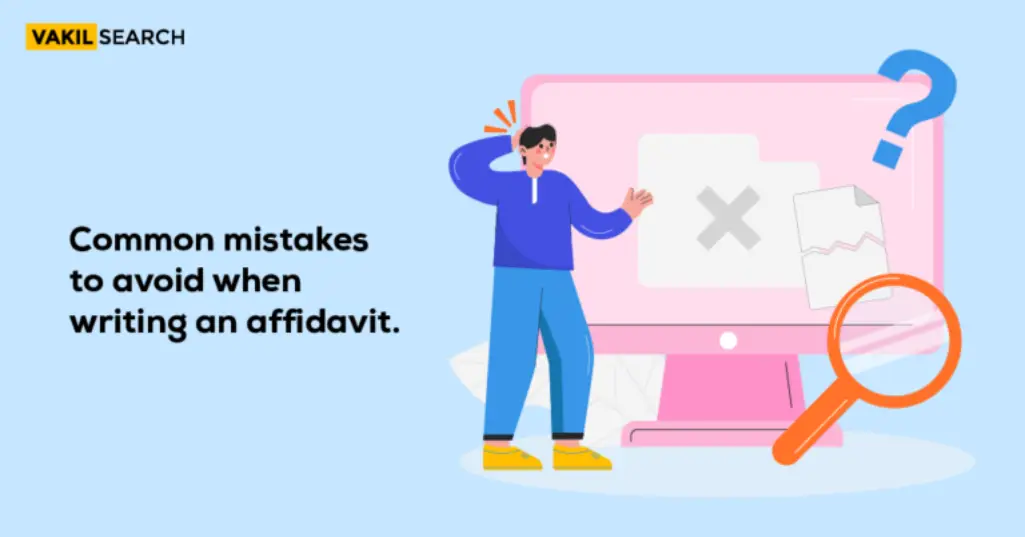Craft precise affidavits with our guide, avoiding common mistakes like inaccurate information, notary oversights, and format neglect. Trust Vakilsearch for professional assistance.
In the legal world, an affidavit is a sworn statement that holds significant weight in various proceedings. Its effectiveness depends on the accuracy and clarity of the information it contains. This guide explores common mistakes individuals often make when writing affidavits and offers insights into avoiding these pitfalls. Know about Common Mistakes to Avoid When drafting an Affidavit.
Providing Inaccurate Information
Accuracy is paramount in an affidavit. Providing inaccurate information not only compromises the document’s integrity but can also lead to legal consequences. This section delves into the importance of truthful statements and the potential repercussions of inaccuracies.
Overlooking Notary Requirement
Many affidavits require notarisation to be legally valid. Overlooking or neglecting this essential step can render the affidavit ineffective. Here, we explore the role of notary publics, the notarisation process, and the consequences of failing to fulfill this requirement.
Neglecting the Specific Format
Different affidavits serve various legal needs, each with its specific format and requirements. Neglecting to the prescribed format can result in rejection or difficulties in legal proceedings. This section highlights the importance of tailoring affidavits to their intended purpose.
Using Ambiguous Language
Ambiguous language can lead to misunderstandings and misinterpretations, diminishing the affidavit’s effectiveness. This segment emphasises the significance of clarity in language, offering tips on avoiding ambiguity and ensuring that the affidavit communicates the intended message unequivocally.
Failing to Include Crucial Details
An affidavit should encompass all relevant details about the matter at hand. Failing to include crucial information may weaken the document’s impact. Here, we discuss the key details that should be incorporated into an affidavit, ensuring its completeness and relevance.
Ignoring Legal Assistance
In complex legal matters, seeking professional assistance is advisable. This section explores the role of legal experts, such as services provided by Vakilsearch, in guiding individuals through the affidavit drafting process. Legal professionals ensure compliance with relevant laws and help individuals avoid common pitfalls.
Using Legalese Unnecessarily
Affidavits need to be understandable to all parties involved, including judges and other legal professionals. Unnecessarily incorporating legalese can hinder clarity. This part discusses the importance of using plain language and offers tips on simplifying complex legal concepts for better understanding.
Rushing the Review Process
Before finalizing an affidavit, a thorough review is essential. Rushing through this crucial step can result in oversights and errors. Here, we emphasise the importance of careful review, providing a checklist to ensure that the affidavit is accurate, complete, and meets all legal requirements.
Neglecting Updates in Legal Requirements
Legal requirements may evolve, and affidavits must adapt to these changes. Neglecting updates in legal standards can lead to non-compliance. This section encourages individuals to stay informed about any changes in legal requirements related to affidavits.
Overlooking Specific Jurisdictional Requirements
Affidavit requirements may vary based on jurisdiction. This part discusses the importance of understanding and adhering to specific jurisdictional nuances, ensuring that the affidavit is valid and enforceable in the relevant legal context.
Conclusion
In conclusion, avoiding common mistakes is crucial when crafting an affidavit. Precision, accuracy, and adherence to legal requirements are paramount. Vakilsearch stands as a valuable resource, offering professional guidance to individuals navigating the intricate process of drafting an affidavit. By steering clear of these common pitfalls, individuals can ensure that their affidavits serve their intended purposes effectively in the complex landscape of legal proceedings.
FAQs
What are the consequences of providing inaccurate information in an affidavit?
Inaccuracy jeopardises the affidavit's integrity, leading to legal consequences. False statements may result in perjury charges, undermining the document's credibility.
Why is notarisation crucial for affidavits?
Notarisation adds legal validity. Neglecting it can render the affidavit ineffective, impacting its acceptance in legal proceedings.
How does using ambiguous language affect affidavits?
Ambiguity hinders clarity, risking misunderstandings. Affidavits should use clear language to convey the intended message unequivocally.
What details are crucial to include in an affidavit?
Key details pertinent to the matter should be included for completeness and relevance, strengthening the affidavit's impact.
Why is professional legal assistance important in affidavit writing?
Legal experts, like Vakilsearch, ensure compliance, guiding individuals to avoid common pitfalls, enhancing accuracy, and meeting legal standards.


